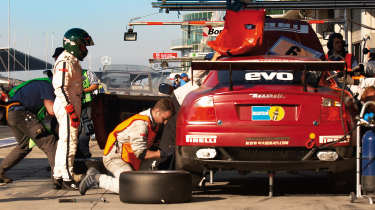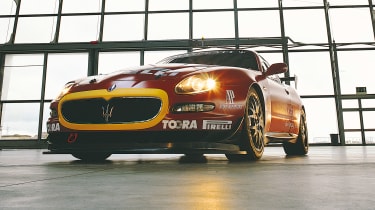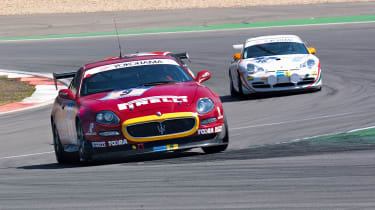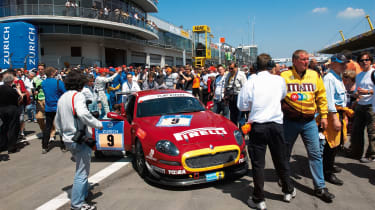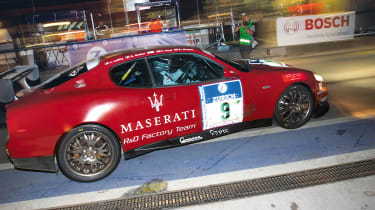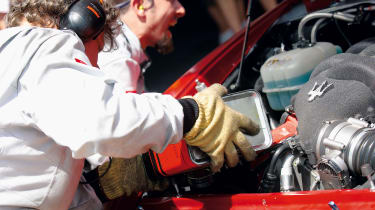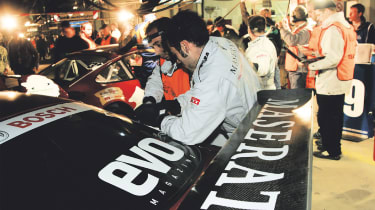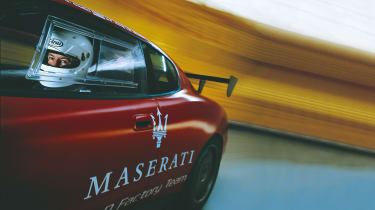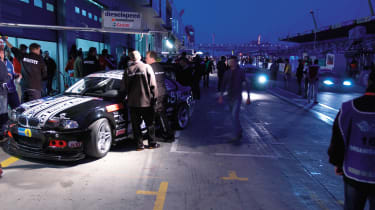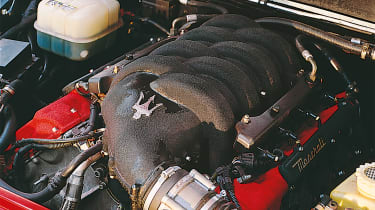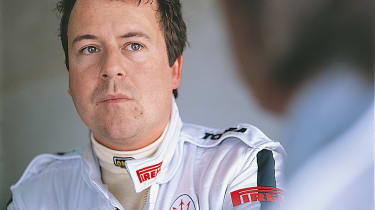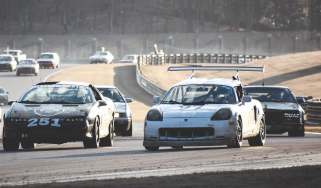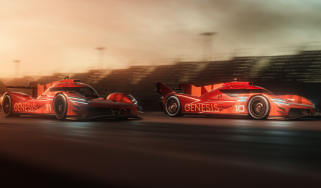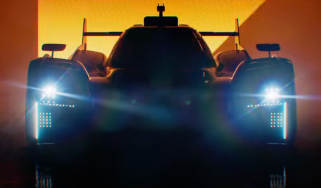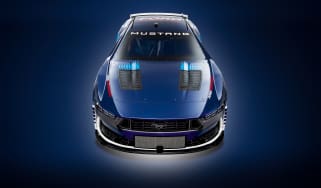Our first taste of the Nürburgring 24 Hours in a Maserati GranSport Trofeo
Back in 2006 evo joined the Maserati factory racing team as it returned to the scene of past glories to tackle the ultimate endurance race, the Nürburgring 24 Hours
There’s no bigger challenge or spectacle in motorsport than the Nürburgring 24 Hours. Held on a special circuit that combines the legendary Nordschleife with the modern GP track to make a lap of more than 15 miles, attended by 200,000 race fans, and contested by more than 200 cars driven by professionals and amateurs alike, it is the world’s ultimate endurance race.
It’s hard to imagine a bigger honour than being invited by Maserati’s R&D Factory Team to join the marque’s historic return to this fearsome venue – a place that saw Fangio deliver the finest race of his glittering career behind the wheel of a Maserati 250F. It’s also a prospect of daunting magnitude.
> Nürburgring 24 Hours 2023 – N24 race preview
The R&D team was formed specially to compete in the Ring 24 Hours, as a means of testing engineering ideas, and to prove the reliability of Maserati’s road cars. For the 2006 race, a special ‘Laboratorio’ version of Maserati’s GT3 Light FIA racer has been entered in Vitaphone livery, to be driven by works drivers Michael Bartels, Andrea Bertolini and Eric van de Poele, while the car I’m to drive is a more standard GranSport Trofeo, painted in the evocative red and yellow of Maserati’s famous works racers of the 1950s. I’m sharing it with three other drivers: American Patrick Hong, a journalist from Road & Track magazine, Gianni Giudici, an Italian gentleman racer who has extensive experience of the Nürburgring, and a certain Jacques Laffite, French F1 hero of the ’70s and ’80s.
We’re competing in the SP8 class, which is a production-based class for cars with engine capacity of between 4 and 6.2 litres. That puts us up against some terrific machinery, including a V8 Dodge Viper, Lamborghini Gallardo, Audi RS4, Wiessman, Aston Martin V8 Vantage (driven by Dr Ulrich Bez and test drivers Chris Porritt, Wolfgang Schuhbauer and Ring ace Horst von Saurma) and, er, a Mercedes 500SEC that started its racing career with 250,000km on the clock and has completed countless Ring 24-hour races since. Such variety is the spice of this event.
Signing-on starts on Thursday, but Hong and I arrive on Monday so that we can attend a rookie training event, organised by the Nürburgring Motorsport Akademie. It’s here that we learn about the vagaries of this unique race, and get to lap the circuit for a whole morning with the help of expert instructors. I’m treating it as a quick reminder of the circuit, but for Hong it’s his first experience of the place. He doesn’t so much have a learning curve to climb as a sheer cliff, but by course’s end he’s well on his way to learning the track, albeit with a sense of deep foreboding!
After nerve-wracking daytime and night-time practice sessions on Friday, we all complete our statutory two timed laps. The pressure is ramping up, but the final few hours’ build-up to the 3pm start on Saturday is like a carnival, and provides a welcome distraction. The pit straight is awash with excited fans, stressed team personnel, nervous drivers, grid girls and brightly coloured cars. I feel odd, detached almost. Seeing my name on the roof of the Maserati is just plain surreal.
Because there are so many cars, the race has to be started in groups of 70 or so, each forming their own grid and led around the green-flag lap at three-minute intervals by a safety car. It’s a confusing process, but once all have completed their first racing lap, the timekeepers compensate for the three- or six-minute delay so all cars effectively start the race as one. Laffite starts for us, as he has far more experience and, let’s face it, is a much bigger media draw than a lucky hack that no one’s heard of. Besides, the thought of piling into turn one alongside 69 other pumped-up drivers fills me with dread.
The sun beats down as the field powers past the flag. Air horns blare, banners wave. It feels strange watching the cars barrelling around the GP circuit before shimmying over the crest to join the gnarly old Nordschleife. It’s like authorised anarchy.
We’ve agreed our next driver should be in the pits, suited and ready to go, in case the driver on the circuit has a problem. So, when Hong takes over from Monsieur Laffite, I don my overalls and wait in the garage, nervously scanning the screens, dreading my first stint, but hoping beyond all hope that the car doesn’t suffer a premature failure and deny me a drive. Such conflicting emotions, it seems, are part of racing here.
Hong’s doing well, staying out of trouble and lapping the massive circuit, which until just a few days before he’d only driven on a PlayStation, in around 11 minutes. The team’s plan is to put each of us in the car for six-lap stints, both to get a handle on fuel consumption and to make sure we each get at least one go in the car before dark.
We suffer an early setback: Laffite misinterpreted the ‘IN’ signal on his pitboard to mean come in immediately, via the emergency pitlane, rather than through the conventional pitlane entry at the end of his next lap. We lose a lap as a penalty, and coupled with Hong’s understandably steady pace it means we’re running in a rather lowly 155th place by the end of the second hour. A team member cheekily suggests that I need to bring the car back in 100th place at the end of my stint. I smile, but privately think that I’d settle for simply bringing it back in one piece.
I get the nod. Hong’s completing his last lap. Time to push the radio earpieces into my lugs, pull on my balaclava, HANS device, helmet and gloves and go to stand in the pitlane. My stomach bubbles with anticipation, the responsibility of returning the car in one piece fighting with the desire to haul us back up the order. And then it appears, the satin scarlet bodywork and bright yellow noseband followed by the sharp, revvy tone of a Maserati V8. This is it. No going back.
The team springs into action. Air jacks hiss, wheel wrenches chatter, the air fills with high-octane petrol fumes. Hong hops out, eyes wide, face speckled with sweat. I fold myself up, drop through the roll-cage and into the seat. As I’m strapped in and the radio is hooked up to my helmet, I watch the guys work on the car. The bonnet comes down, the screen is sprayed and cleaned of rubber smears and dead bugs, the staccato click-click of the torque wrench providing a reassuring percussive beat to the soundtrack as each wheel nut is checked. It’s a mesmerising process, but a bang on the bonnet snaps me to. Flick the ignition toggle, start the engine, pull back on the right-hand paddle for first, then watch intently as a crew member scans the pitlane for approaching traffic, before waving me out on my way. It feels like my head is going to burst.
The radio fizzes into life as race engineer Fabio Tosi calls an important reminder. ‘Richard, Richard. Remember, 60kph in the pitlane, repeat, 60kph in the pitlane.’ A quick look at the speedo confirms we’re OK. Just. Wait for the green light at the end of the pitlane, then boot it. Revs flare and the tail squirms as brand new Pirelli slicks submit to 425bhp. Don’t get carried away, Dickie. There’s still 22 hours to go.
It takes most of the GP circuit to get some heat into the tyres. I feel a bit lost, jumpy, tense, and I’m struggling to focus. Fortunately I’ve emerged into a clear section of track, and manage to complete the GP circuit without being ambushed by quicker cars. But the Nordschleife awaits, and I’m as nervous as hell.
The track’s change in character is immediate. The graffiti, the air horns, the bumps, kerbs and cambers. It’s almost overwhelming. The run through Hatzenbach is a real wake-up call, the car dancing on the cambers, the proximity to the barriers massively intimidating. All your attention is focused through the windscreen. Picking your line, scouring the marshals’ posts for flag signals. And then, after who knows how long, you glance in the rear-view mirror and it’s full, and I mean full of yellow and green Porsche. Shit! It’s the leading Manthey car, lights ablaze, bright blue strobe pulsing in the windscreen denoting its Top 20 qualifying pace. It’s positively crackling with aggression and urgency, and I literally jump out of the way, picking up what feels like 10kg of marbles – the detritus that gathers off-line – on my fresh slicks in the process, as the awesomely quick Porsche punches past, the second-place Altzen 997 GT3 tucked into its wake.
After that baptism of fire, a bizarre state of calm washes over me. I’ve been lapped by the fastest cars on the track, and made it past countless slower cars, all in the space of ten minutes. Other than torrential rain, which was my biggest pre-race fear, traffic was my main worry, but now that I’ve been both lapper and lapped I’m really beginning to relish the experience. It’s a buzz of unmatched intensity.
The remaining five laps pass without incident, although each time round I can see the remains of massive accidents, even at this early stage. Confidence growing, both in myself and the car, my lap times begin to tumble, settling comfortably between 10min 5sec and 10min 15sec, which if you ignore the time spent on the GP circuit, equates to a best Nordschleife lap of around 7min 45sec. I return to the pits and hand over to our fourth driver Giudici. I emerge much as Hong did: hot, sweaty, buzzing, relieved. Proud too, as we’re now in 101st place…
Disaster strikes the Vitaphone car. A backmarker has turned across van de Poele’s bow. With nowhere to go, EvdP hits the rear corner of the Golf hard, the VW barrel-rolling into the air and hitting the roof of the Maser, before finally coming to rest, capsized, on the barriers. From the helicopter view shown on the TV screens it looks bad, but the mechanics prepare a new nose, door and rear wheelarch, along with a fresh front subframe and suspension, in the vain hope that the car can drag itself back to the pits. It can’t, and I catch a glimpse of Bartels, face smouldering with anger and disappointment, as he powers away from the paddock on his scooter. All Maserati’s hopes now rest with us.
My first night stint beckons. The sky is just changing from inky blue to velvet black when Hong returns to the pits. There’s a big, burnt rub mark on the passenger door, scars left by a Viper that barged its way past. It’s almost 11pm. Cars scream by in the darkness, the frantic fury of the Manthey 911 tearing strips out of the muggy night air. My nerves are jangling. If someone came up to me, put their arm around my shoulder and said, ‘It’s OK, Dickie, I’ll drive this stint,’ I’d run back inside. But I know that’s not going to happen, and the feeling of inevitability is nauseating as I wait in the pit box. The pitlane is bathed in light, gantry after gantry illuminating cars as they refuel.
Back into the car. The GP circuit feels like nothing now, a wide open space that serves only to allow you time to fill your lungs before plunging into the depths of the Green Hell, now rendered a smothering, impenetrable black by the cloak of night. Laffite is right, the lights are terrible. I’d always wondered why seasoned ADAC 24-hour cars had seemingly cross-eyed spotlights pointing left and right, but now, chasing a narrow pencil of light, I know. Without them it’s impossible to see the kerbs, while the cresting nature of almost every corner renders the conventional main beam largely useless. I feel like a blind man who’s lost his guide dog.
At Hohe Acht, the highest point of the circuit, the crowd is partying. Smoke hangs in the air like thick fog infused with the smell of sizzling sausages. Flashguns pop in the darkness, airhorns honk, music thumps. I can even hear the inebriated bray of drunk German fans. Having been up here earlier in the week, I’m petrified of breaking down out here, for the crowd are a primitive bunch, stripped to the waist, sunburnt and fuelled on potent lager. It’s like a zoo. No, strike that. It’s like Jurassic Park. We were told before the race to carry plenty of euros in our overalls, for many fans can be persuaded to siphon fuel from their cars. The rules don’t allow outside assistance, but no one ever complains, apparently.
At just after midnight I’m overjoyed to be back in the pits with car and myself in one piece. With Giudici, Laffite and Hong between me and my next stint, I head back to my room in the vain hope of a little sleep. Fat chance. I manage snatched catnaps, but every five minutes I jolt awake, scared I’ve overslept. By 1am I give up, get back into my overalls and wander back to the pits, sick with nerves and fatigue.
When I return, Hong is in and driving, and I find Laffite returning to the hospitality area, eyes blazing, face flushed with uncharacteristic anger after his first fully dark stint. ‘Zat was unbelievable! I could not see a f***ing thing. Zee lights are sheet. Un-be-live-vable. I am not driving again in ze night. F*** zat!’ I make my way to the pit garage via the toilet.
Tosi has started to stretch our stints, his colleague Massimo Portiolo having calculated each driver’s fuel consumption and relative pace. With my second night stint approaching he’s happy to push the tank of fuel to eight laps, but has suggested reducing our pace to around 11 minutes, both to save fuel and the car. Eight laps equates to 122 miles of flat-out driving, with compromised visibility, on the toughest racetrack in the world. The nerves return with a vengeance as I drive down the pitlane.
Every lap I’ve radioed Tosi to say I’m entering the Nordschleife, as our radio signal fades soon after. Every lap he’s replied with a simple: ‘OK. OK.’ At night his voice becomes a lifeline, one final piece of reassurance before plunging into the turmoil. With the darkness has come an addition to his message: ‘OK. OK. Take care, Richard.’ I feel like an Apollo astronaut passing around the dark side of the moon.
The track seems quieter now. Dozens of cars have retired, many after violent accidents, and as I pick my way around the first lap, shadowy debris lurks trackside, testament to some sickening shunts. Perhaps because of the dark and its skewing effect on my senses, I’m more aware of the Maserati and its noises. The engine still sounds beautifully bassy, emitting a tremendous V8 snargle through the mid-range, but there’s a worrying transmission clatter. The shifts are still clean, but it feels and sounds tired. Hardly any wonder, with around 90 full-bore shifts per lap.
My first two laps are bang on 11 minutes, but it’s hard to drive so slowly. I settle on letting a car by, assessing its pace and then following it at a safe distance. It works well enough, apart from the time I let a clearly confused Opel Corsa driver pass me, only to sit behind him twiddling my thumbs before he waves me by. Eventually I hook up with an M Coupe running a comfortable 10min 35sec pace. His lights are good too, so I use him as a pathfinder for three enjoyable laps. Then the frontrunners come by and separate us, the sudden solitude hitting me hard. Tiredness is taking its toll, too. Concentration is getting harder by the lap, little mistakes creeping in, releasing jolts of adrenaline through my system.
I find another partner – a Honda S2000 – and though it’s slower than I’d like to run, I just want to survive this low ebb of energy. All is well as we skim along the endless Döttinger Höhe straight, the crisp VTEC bark of the Honda audible over the Maser’s rich V8 growl, relaxed on three-quarter throttle. Through the Tiergarten kink we go, braking comfortably for the final twists before the pit straight. But then something very odd happens. The Honda, once calm and controlled, locks up and spears over the kerbs, launching itself almost head-on into the barriers before clattering back into my path, crippled engine screaming, steam and fluid spilling onto the track. I’m stunned at what I’ve just witnessed, but relieved to have cleared the carnage.
As I pass the pits, Tosi’s voice fills my ears. ‘Richard, you have one lap left, then pit. One question. Do you think you could do another stint? Repeat, could you do another stint?’ I reply before I have a chance to change my mind: ‘Pit after this lap, then complete another stint. Yes. OK.’
The stop goes without a problem. New front Pirellis go on to cure a vibration caused by pick-up stuck to the tacky rubber, and there’s another tank of fuel. Grab a suck of water from the in-car drinks container, then thump off the air jacks and away we go again.
What follows is one of the most memorable 60 minutes of my life. The darkness had begun to lift towards the end of my last stint, but now the sun is beginning to crawl above the horizon, a spirit-lifting ball of burnt orange heralding what every endurance racer regards as the ultimate experience: racing into the sunrise.
I catch glimpses of mist hanging in far-off forests, the Eifel Mountains providing a serene, tranquil backdrop to this most crazy of races. The sun lifts above the trees, and as we plunge down the rollercoaster flat-in-sixth Fuchsröhre (Foxhole) it’s blinding: so bright I can barely see where I’m going, steering between vivid flashes of red and white curbing and the odd glint of Armco. So bright too, that I can’t see anything in my mirrors, the first hint of being lapped by the Zakspeed Viper being the feral gargle of its engine as the big red bonnet lunges down my right side into the Adenauer Forst chicane.
The transmission noises are still a concern, so I decide to upshift at 6500rpm rather than the 7500rpm red line. I also try to take corners a gear higher, again to reduce the wear on the car. It feels good: smooth, relaxed and just as quick. By the end of the second stint I’m lapping faster than before, but using less fuel in the process: the ideal endurance racing combination.
It’s 7am when I get out of the car, just minutes short of the two-and-a-half hours maximum any driver is allowed to run without a break. I’ve driven 14 laps – or 214 miles – non-stop, but I swear it feels like I was in the car for just 20 minutes.
Everyone is elated the car got through the night. We’re solidly into the top 50 now, but it’s hard to believe we still have eight hours to survive. My last stint comes at midday. After the worries of last night the car actually feels better, but you can’t relax. Every lap I encounter the aftermath of a crash seemingly bigger than the last. Now more than ever, the race is about survival.
I try to savour my last lap. On the exit of Steilstrecke, Union Jack-waving fans give me a honk of air horn and the thumbs up, while some Italians wave the Tricolore before the Karussell. I wave back, proud to be driving a Maserati, elated to have survived this incredible race.
Back in the pits I hand over to Giudici for the last 90 minutes. Most of the mechanics gather in the pit box, leaving the tireless Tosi on the pit wall as the last laps are reeled off. Alongside me is Maserati boss Karl-Heinz Kalbfell, as desperate as I am to see the last hour pass. It’s a tortuous time. With a lap to go we spill into the pitlane, Hong and I climbing the retaining fence to wave Giudici home. It seems to take an age, then the red and yellow nose spears into view. After 24 hours, 9 minutes and 44 seconds, 126 laps, 1927 miles and more than 11,000 gearshifts, the Maserati GranSport Trofeo crosses the line, 36th overall and 5th in class. Everyone shouts and hollers, hugs and smiles. It’s a euphoric moment. What a car. What a race.
This story was first featured in evo issue 275.
